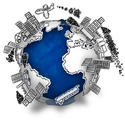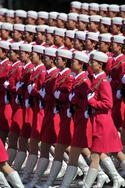China
In Southern China, the Pearl River Delta is giving rise to an urban super-power in the first rank.
In 2005, the wealthiest metropolises were still led by the thriving urban agglomerations of the leading advanced economies in North America, Western Europe and Japan; that is, Tokyo, New York City, Los Angeles, Chicago, Paris and London. The scale economies of these metropolises are as significant as those of many national economies. For instance, the estimated GDP of Tokyo and New York City, respectively, was not that different from the total GDP of Canada or Spain, whereas London’s estimated GDP was higher than that of Sweden or Switzerland. read more »
For much of the past decade, "declinism" – the notion that America is heading toward a deadly denouement – has largely been a philosophy of the left. But more recently, particularly in the wake of Barack Obama's election, conservatives have begun joining the chorus, albeit singing a somewhat different variation on the same tune. read more »
America's population growth makes it a notable outlier among the advanced industrialized countries. The country boasts a fertility rate 50% higher than that of Russia, Germany or Japan and well above that of China, Italy, Singapore, North Korea and virtually all of eastern Europe. Add to that the even greater impact of continued large-scale immigration to America from around the world. By the year 2050, the U.S. population will swell by roughly 100 million, and the country's demographic vitality will drive its economic resilience in the coming decades. read more »
If the U.S. were a stock, it would be trading at historic lows. The budget deficit is out of control, the economy is anemic and the political system is controlled by academic ideologues and Chicago hacks. Opposing them is a force largely comprised of know-nothings--to call them Neanderthals would be too complimentary.
Not surprisingly, many Americans have become pessimistic. Two in three adults now fear their children will be worse off than they are. Nearly 40% think China will become the world's dominant power in the next 20 years, as indicated by a recent survey. read more »
Whatever the results of the Copenhagen conference on climate change, one thing is for sure: Draconian reductions on carbon emissions will be tacitly accepted by the most developed economies and sloughed off by many developing ones. In essence, emerging economies get to cut their "carbon" intensity--a natural product of their economic evolution--while we get to cut our throats.
The logic behind this prediction goes something like this. Since the West created the industrial revolution and the greenhouse gases that supposedly caused this "crisis," it's our obligation to take much of the burden for cleaning them up. read more »
Ever since Richard Nixon visited China in winter 1972—an event timed to play into that year’s presidential elections—American presidents have made the pilgrimage to the modern version of the Forbidden City.
Landing in Shanghai on Sunday evening, President Obama has two days of meetings with the Chinese leadership, not to mention a town hall event with Chinese students (as if they were eligible to vote in a New Hampshire primary).
As a stage-set for photo opportunities, China is hard to beat. American presidents can walk the Great Wall, toast a nation in the Great Hall of the People, tower over diminutive Chinese leaders dressed in gray Mao suits, and make sweeping statements about new world orders. read more »
With autocratic states like China and Russia looking poised for economic recovery, it's often hard to make the case for ideals such as democracy and rule of law. To some, like Martin Jacques, author of When China Rules, autocrats seem destined to rule the world economy. read more »
Barack Obama goes to this week's Pittsburgh G-20 with what seems the weakest hand of any American president since Gerald Ford. In reality, he has a far stronger set of cards to play — he just needs to recognize it.
Our adversaries may like our new president, but they don't fear him. And, on the surface, why should they? The national debt is rising faster than the vig for a compulsive, debt-ridden gambler. And our primary rivals, the Chinese, continue to put the squeeze on American producers by devaluing their currency, subsidizing exports and penalizing imports. read more »
Not for the first time, reality and politics may be on a collision course. This time it’s in respect to the costs of strategies intended to reduce greenhouse gas emissions. The Waxman-Markey “cap and trade” bill still awaits consideration by the US Senate, interest groups – mainly rapid transit, green groups and urban land owners – epitomized by the “Moving Cooler” coalition but they are already “low-balling” the costs of implementation. read more »
Changsha, Hunan (China): Over the past 30 years, China has eradicated more poverty than any nation in the world’s history. The reforms instituted by Deng Xiaopeng have not only created a large, new middle class in China, but have also produced some of the largest and architecturally most impressive urban areas in the world. There is still poverty in China, but the most extreme poverty is in the rural areas. The expansive shanty-town poverty found in Manila, Jakarta, Mexico City, Sao Paulo or Mumbai is absent in the large Chinese urban areas. read more »
|



















